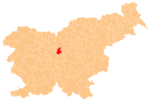|
Franc Rode
Franc Rode CM (or Rodé;[1] born 23 September 1934) is a Slovenian cardinal of the Catholic Church. He is the prefect emeritus of the Dicastery for Institutes of Consecrated Life and Societies of Apostolic Life, having served as prefect from 2004 to 2011. He was elevated to the cardinalate in 2006.[2] He was raised to the rank of cardinal-priest on 20 June 2016 by Pope Francis. BiographyEarly life and religious professionFranc Rode was born in Rodica near Ljubljana, in Yugoslavia (modern-day Slovenia). In 1945, he and his family sought refuge in Austria and later fled to Argentina in 1948. He entered the Congregation of the Mission, more commonly known as the Vincentians or Lazarists, in Buenos Aires in 1952, making his perpetual profession in 1957. Rode studied at the Pontifical Gregorian University in Rome, and at the Catholic Institute of Paris, from where he obtained his doctorate in theology in 1968. Rode is fluent in Slovene, Spanish, Italian, French, and German. Pastoral workRode was ordained to the priesthood by Bishop André-Jean-François Defebvre CM, on 29 June 1960 in Paris. In 1965, at the request of his superiors, Rode returned to Yugoslavia, where he worked as vice-pastor, director of studies and provincial visitor of the Lazarists, and professor of fundamental theology and Missiology at the Theological Faculty of Ljubljana. Curial workIn 1978, Rode was made consultor of the Secretariat for Non-Believers in the Roman Curia, being transferred to that dicastery in 1981 and rising to become its Undersecretary in 1982. During this time, he assisted in the organization of some significant dialogue sessions with European Marxists. When Pope John Paul II united the Pontifical Council for Culture and Pontifical Council for Non-Believers in 1993, he appointed Rode Secretary of the new Pontifical Council for Culture. As Secretary, he served as the second-highest official of that dicastery, under Paul Poupard. ArchbishopOn 5 March 1997, Pope John Paul appointed Rode Archbishop of Ljubljana. He received his episcopal consecration on the following 6 April from Archbishop Alojzij Šuštar, with Archbishop Franc Perko and Cardinal Aloysius Ambrozic, Archbishop of Toronto, a fellow ethnic Slovene bishop from the diaspora serving as co-consecrators, in the Cathedral of Ljubljana. Rode successfully guided the negotiations for a new concordat to final approval in 2004. CardinalRode was created a Cardinal Deacon by Pope Benedict XVI on 24 March 2006. His motto is a phrase in Old Slovene, "Stati inu obstati" (To Exist and Persevere / To Stand and Withstand), taken from the Catechism of Primož Trubar, which is also inscribed on the Slovenian 1 euro coin. In 2013, he was the first Slovenian in history to participate in a papal conclave.[citation needed] Congregation for Institutes of Consecrated LifeRode returned to the Roman Curia upon his nomination as prefect of the Congregation for Institutes of Consecrated Life and Societies of Apostolic Life on 11 February 2004.[3] Pope Benedict XVI later created Rode Cardinal-Deacon of S. Francesco Saverio alla Garbatella in the consistory of 24 March 2006. In January 2011, he retired as the prefect of the Congregation.[4][5] Until his 80th birthday, Rode was a member of the various offices in the Roman Curia: congregations of Divine Worship and the Discipline of the Sacraments; for Bishops; for the Evangelization of Peoples; for Catholic Education; Pontifical Council for Culture and the Pontifical Commission Ecclesia Dei. He was one of the cardinal electors who participated in the 2013 papal conclave that elected Pope Francis. Allegations of fatherhoodIn August 2012, the Slovenian newspaper Delo reported allegations that Rode had fathered a child.[6] Rode denied the allegations and expressed willingness to submit to a DNA test. He also announced lawsuits against the media for alleged breaches of his right to privacy. "After all they've done to me they deserve this," he said.[7] In October 2012, the alleged child, Peter Stelzer, and the alleged father, Franc Rode, performed a DNA test of fatherhood at the Institute for Legal Medicine in Munich. The test was reported negative by the institute and both Rode and Stelzer irrevocably agreed with the reported result.[8][9] References
External links
|
||||||||||||||||||||||||||||||||||||||||||||


